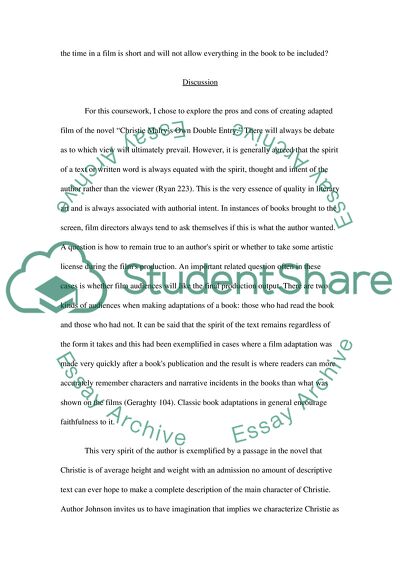
- Home
- Free Samples
- Premium Essays
- Editing Services
- Extra Tools
- Essay Writing Help
- About Us
- Studentshare
- Subjects
- Visual Arts & Film Studies
- Difficulties in Screening Books
Difficulties in Screening Books - Essay Example

- Subject: Visual Arts & Film Studies
- Type: Essay
- Level: Undergraduate
- Pages: 6 (1500 words)
- Downloads: 0
- Author: goldnerloyce
Extract of sample "Difficulties in Screening Books"
A question is how to remain true to an authors spirit or whether to take some artistic license during the films production. An important related question often in these cases is whether film audiences will like the final production output. There are two kinds of audiences when making adaptations of a book: those who had read the book and those who had not. It can be said that the spirit of the text remains regardless of the form it takes and this had been exemplified in cases where a film adaptation was made very quickly after a books publication and the result is where readers can more accurately remember characters and narrative incidents in the books than what was shown on the films (Geraghty 104).
Classic book adaptations in general encourage faithfulness to it. This very spirit of the author is exemplified by a passage in the novel that Christie is of average height and weight with an admission no amount of descriptive text can ever hope to make a complete description of the main character of Christie. Author Johnson invites us to have imagination that implies we characterize Christie as someone similar to us. This way, the author solves his own problem of how best to describe his character by asking us to make our own descriptions.
Besides, the author said time is running out with, Christie remarking the novel is short (Johnson 40). A main difficulty in transforming book into film is how to convey an idea in the book to a scene in the film that can be easily understood by audiences. There is a big danger here if the director and scriptwriter are not careful. Certain ideas put on the film can be misconstrued by an audience (especially those not familiar with the book). An example are the self-arguments going on inside Christies mind when he realized the beauty of the double-entry system (after taking up an accountancy course) and decides to use this system to settle perceived injustices he got from society as a whole.
He comes up with the idea certain people had limited his choices and decides to take some form of revenge. In this portion of the novel, he takes offense at an office block and gets his sense of reward by making an unsightly line scratching the building with a coin (Johnson 24). This act can be seen on film but what cannot be conveyed to an audience were the debates in his mind. Other ideas in the novel can easily be reflected on film, such as Christies growing sense of anger and shown in bigger acts of revenge that now target whole society and not just specific individuals.
This increasingly growing angst has jumped from mere bomb hoaxes to planning large-scale retribution by mass poisoning of Londons water supplies which are portrayed on film but putting thoughts to film is difficult. One way to circumvent this limitation is hiring actors who are “perceptual thinkers” and very good at putting thoughts into their own personal feelings and style (Semsel, Xia & Hou 158). Some things just simply cannot be adequately captured on film no matter how good a director is.
Sometimes, the novel loses representational authority when made on film and it is the novel that gets edited instead of the film. Film researchers are often forced to change the novel to suit directorial requirements. A frequent complaint among literary purists is directors often take compromises with the material. These directors also often assume (quite wrongly) that their intended film audiences are ignorant of their source (Griffin 296). This adaptation of the novel (the act of adapting it) such as inventing creative dialogue and changing the plot in the novel (like certain scenes in different sequences) can cause confusion among viewers.
There are three basic ways of translating a printed work into script form: just follow the book closely, select only a few key scenes or write an original screenplay based on the book. This is due to the visual nature of the film that by necessity time is shortened to key episodes. This means certain paragraphs or entire pages in a book can be condensed into one quick shot by the film maker (Manchel 1305).
Read MoreCHECK THESE SAMPLES OF Difficulties in Screening Books
Learning Difficulties and Dyslexia
Medical Screening
Pupils of Learning Difficulties
Identifying Specific Learning Difficulties
Difficulties That Women Go Through In America
Screening Medical Disorders
Effectiveness of Screening for Malnutrition of the Elderly in the UK
Learning Difficulties and Dyslexia

- TERMS & CONDITIONS
- PRIVACY POLICY
- COOKIES POLICY